Lil Yachty's face? The Circus Liquor store sign? Yes, there's a rug for that
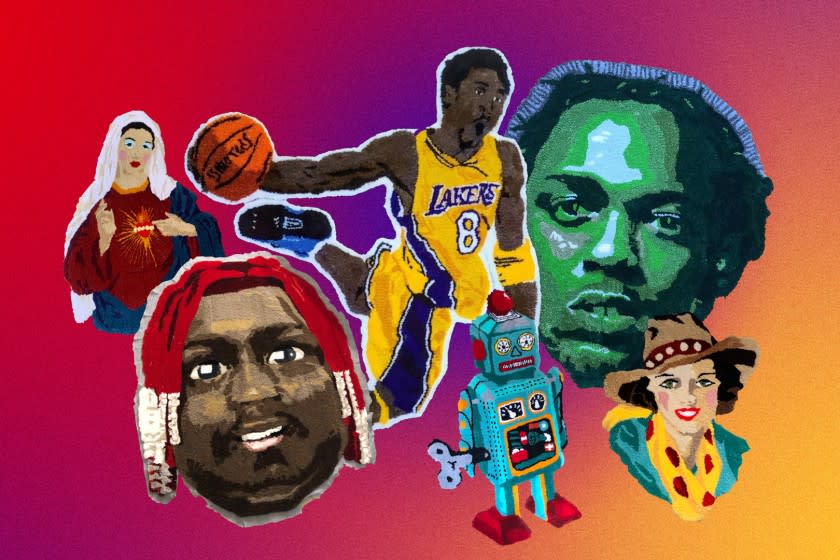
Somewhere on the internet, there’s a multicolored rug in the shape of a mushroom and another modeled after a can of Spam. Fall down the #tufting rabbit hole on Instagram or TikTok even further, and the designs get even more distinctive: SZA’s “Ctrl” album cover, a Nike Air Jordan shoe, a cowgirl named Gretchen with a warm smile. With each new image the question you’ll ask yourself, again and again, is: “Wait, that’s a rug?”
“It’s a handmade, one-of-a-kind piece of artwork that you put on your floor,” explains Ethan Cole, 25, who along with Kellcy Kocinski, 23, owns the L.A.-based business Unwelcome Mats.
Cole and Kocinski are among a crew of newly minted rugmakers whose wild, irreverent rugs — ranging in price from $100 to $1,000 or more — frequently sell out, sometimes in less than 10 minutes. Ever since they put their first design for sale on Instagram, Cole and Kocinski say, demand for their niche accent rugs has skyrocketed.
Most of their customers are, like them, creative people in their 20s. But there have been some surprising outliers. Take the bodybuilding mom of six who bought a rug in the shape of a Bible. Or actress Selma Blair, who snagged a crying girl rug and posted it on her Instagram Stories with the caption “Inspired by my new rug from @unwelcome.mats.”
By Kocinski’s estimate, many of Unwelcome Mats’ most loyal patrons share an ideology as well as a niche obsession. “They’re all woke,” she says. “Everyone is here for the cause.”
From hobbyists to rug dealers
Some people took up breadmaking in quarantine. Others turned to more niche hobbies — such as weaving colorful textiles in idiosyncratic designs. For Cole and Kocinski, who are also a couple, making rugs started with a selfish desire. They’d just moved in together, were spending more time at home because of COVID, and wanted something to accentuate their space that couldn’t be found at Target or Pier 1. Cole, who works in fashion and graphic design, suggested they make their own rug. Kocinski, who works at a technical recruiting company, had some experience latch hooking rugs as a kid and counted herself in. She also thought of how lucrative it might be.
“We didn’t really see people making rugs, so we thought, ‘This is so dope. We can really capitalize on this,’” says Kocinski.
They bought a tufting gun, a high-speed needle punching machine, to make their rugs. (Other rug-making methods include manual punch needling and latch hooking.) Their first rug, an X-rated depiction of two Smurfs in a compromising position, was enough to attract an audience online. And before long, their apartment was becoming a mini textile factory; rugs were taking over.
Cole and Kocinski share responsibilities: Both come up with the image concepts, work with the tufting gun and hand-sew the backing, while Cole designs all the artwork through Adobe Illustrator or Photoshop. Some of their pieces include a 42-by-30-inch Madonna rug (the Catholic icon, not the pop star) in deep shades of blue and burgundy, which sold for $800. A rug version of the famous Circus Liquor sign in North Hollywood, which was 64 by 45 inches, sold for $1,400. Then there was the 25-inch-square replica of rapper MF Doom’s “Operation: Doomsday” album cover, which sold for $600 within minutes of his death being announced in December.
Tufting becomes a playlist
Rugs featuring musicians are still among the most popular, in part due to TikTok. In October, Oscar Morales, a fourth-year design student at USC’s Roski School of Art and Design, documented himself tufting SZA’s “Ctrl” cover on his account @moscarmakes. The 48-hour time lapse showed Morales using his tufting gun over the course of several days as SZA’s song “Love Galore” played in the background. It was played more than 2 million times.
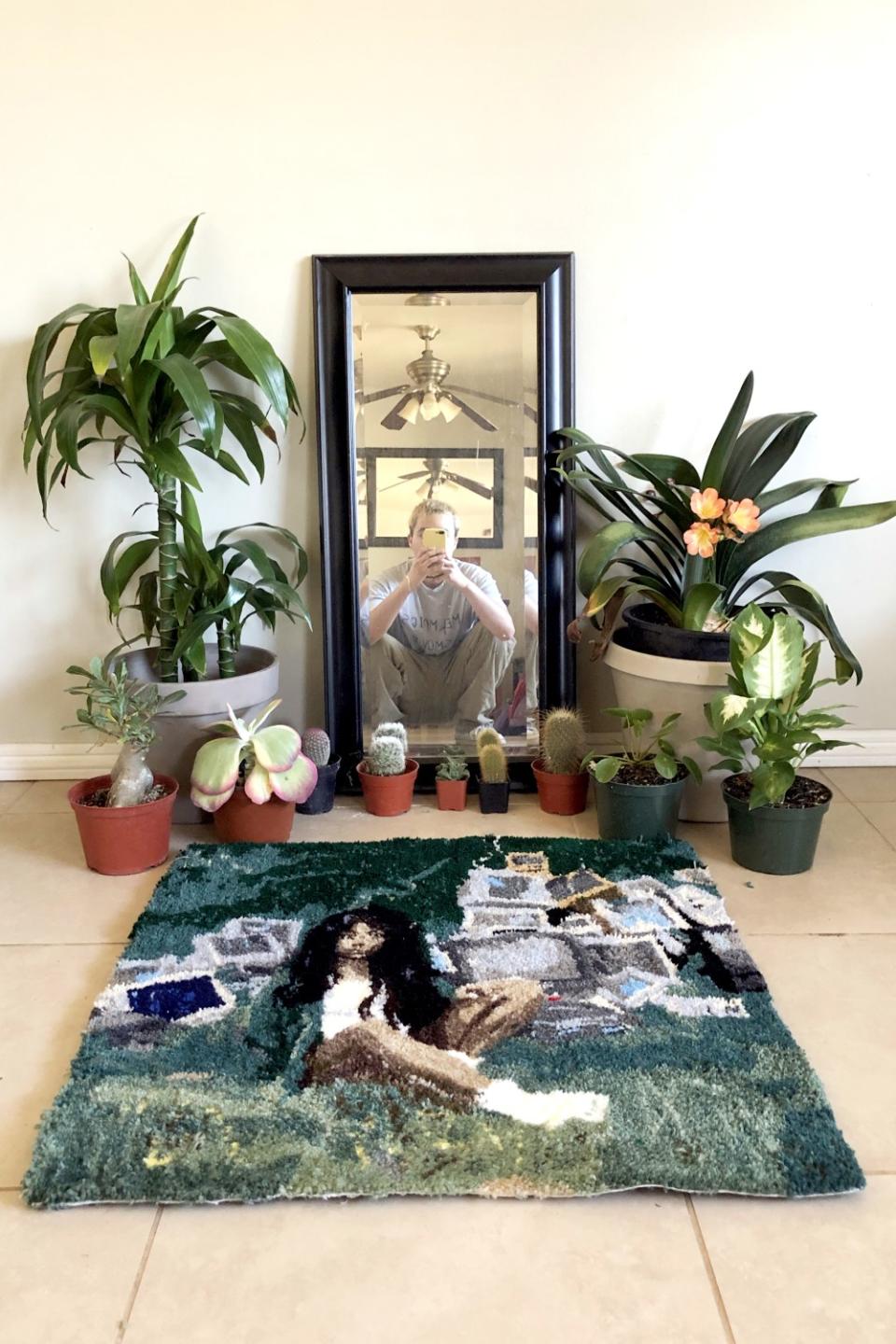
Then there was the rug Morales made of Brent Faiyaz’s “F— the World" album cover, which shows the artist sitting in a brown jacket, jeans and Converse on a white backdrop. The TikTok that Morales made of the process — in which he worked 12 hours straight each day for three days — also was played more than 2 million times. (Faiyaz also saw the rug on Instagram and dropped a few flame emojis in the comments section.)
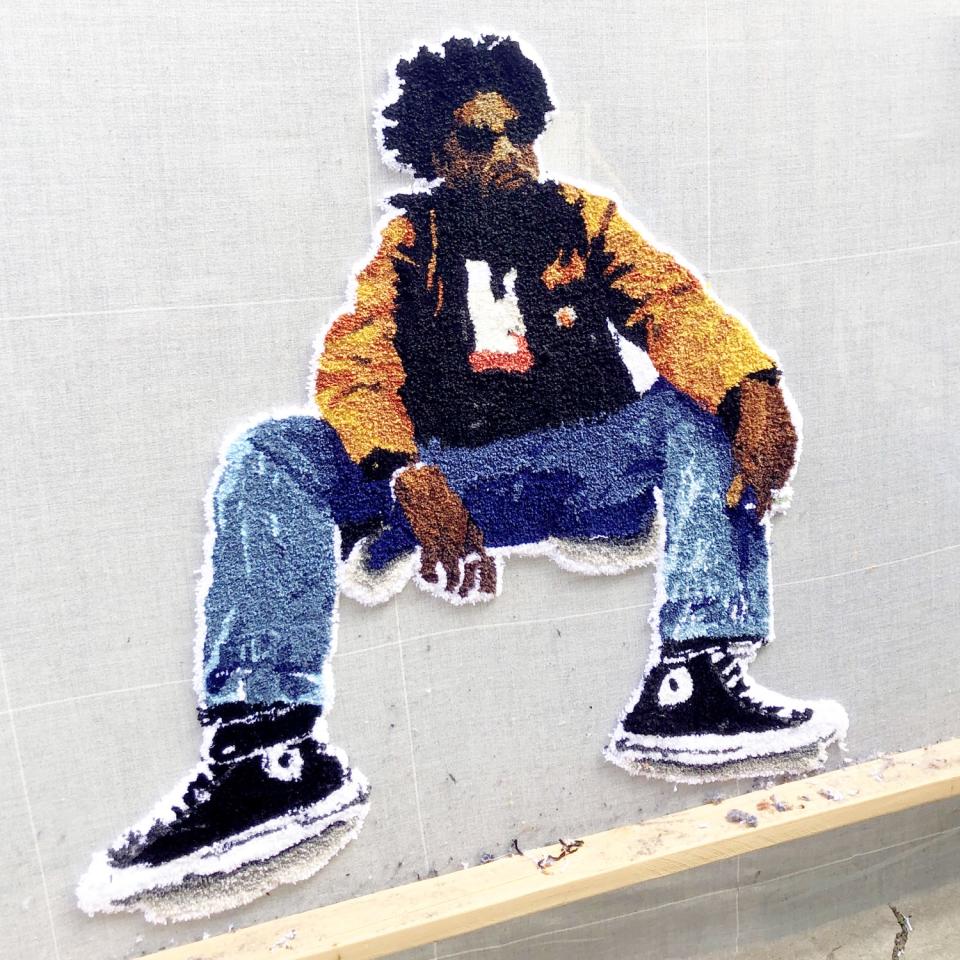
“The SZA rug was a turning point,” Morales, 21, says. “There’s a bunch of very simple rug designs, and I realized that if I wanted to stand out I’d really have to do something different.”
In November, Morales was tapped by a production company that saw his work on TikTok to make a custom rug of Lil Yachty’s face to be sold during the rapper’s live concert. It sold for $500.
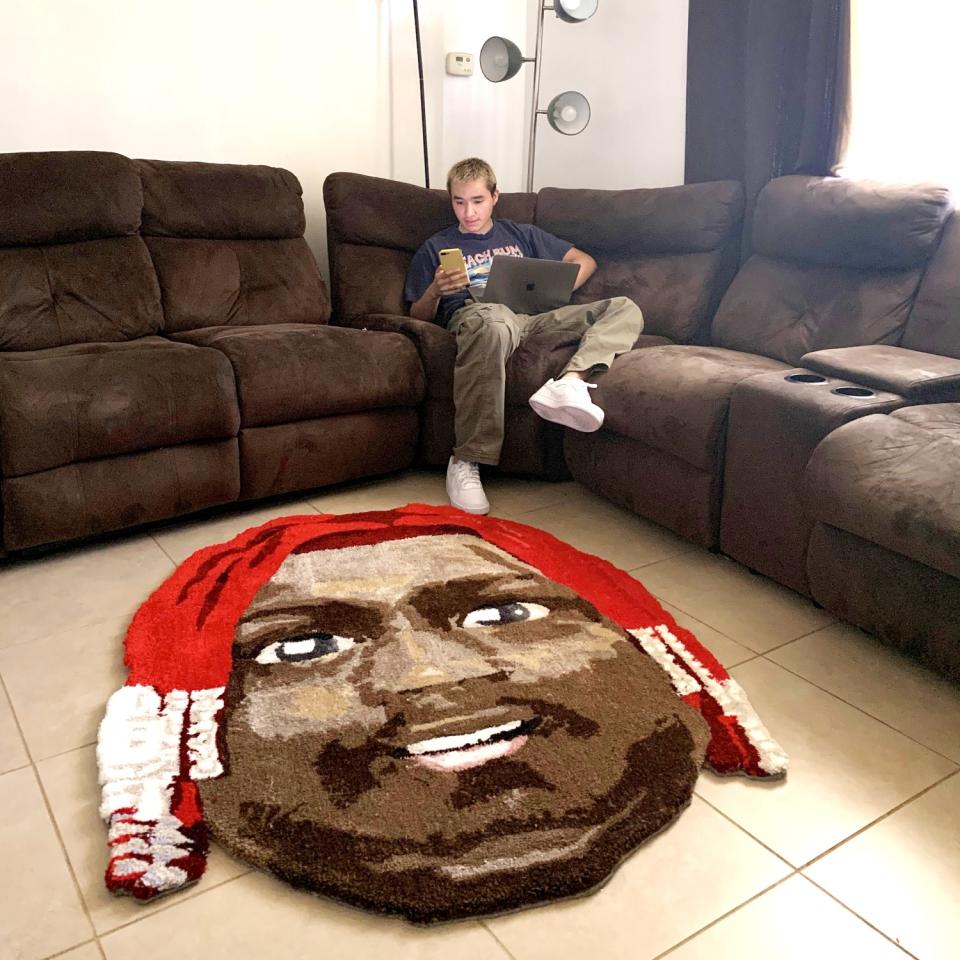
TikTok also is what connected Amanda Peterson’s “Queer Magic” rugs to a community craving more representation in their home decor.
The rugs feature the words “Trans,” “Queer,” “Femme” and other identities in Old English lettering and colors corresponding to the community they’re representing. Peterson makes them in L.A. under the name Magic Carpets, and they sell for $210 to $240.
“There’s not a lot of options for queer people to express their identity in a way that’s also in line with their aesthetic and vibe and style,” Peterson, 26, says. Her rugs meet people where they are, at the intersection of taste and identity.
Easy to learn, expensive to make
Peterson is one of the many rugmakers posting tutorials and Q&As on TikTok and YouTube. In one, she breaks down how much money it takes to get started. Between the tufting gun, spools of yarn, glue and backing materials, Peterson spent upwards of $900 in her first three months of making rugs.
“The unfortunate barrier to this craft is that it is kind of expensive,” she says.
Because of that, tufting has taken a back seat now that Peterson is working full time again. (She got laid off from her job as a user experience designer at Ticketmaster last year, which is when she turned to tufting.)
But for others, it has become a focus.
Claire Gentry makes rugs for hip-hop heads and pop culture fanatics like her. Think Tyler, the Creator performing “IGOR.” Frank Ocean sitting at his orange typewriter. Kobe gliding in full Lakers gear.
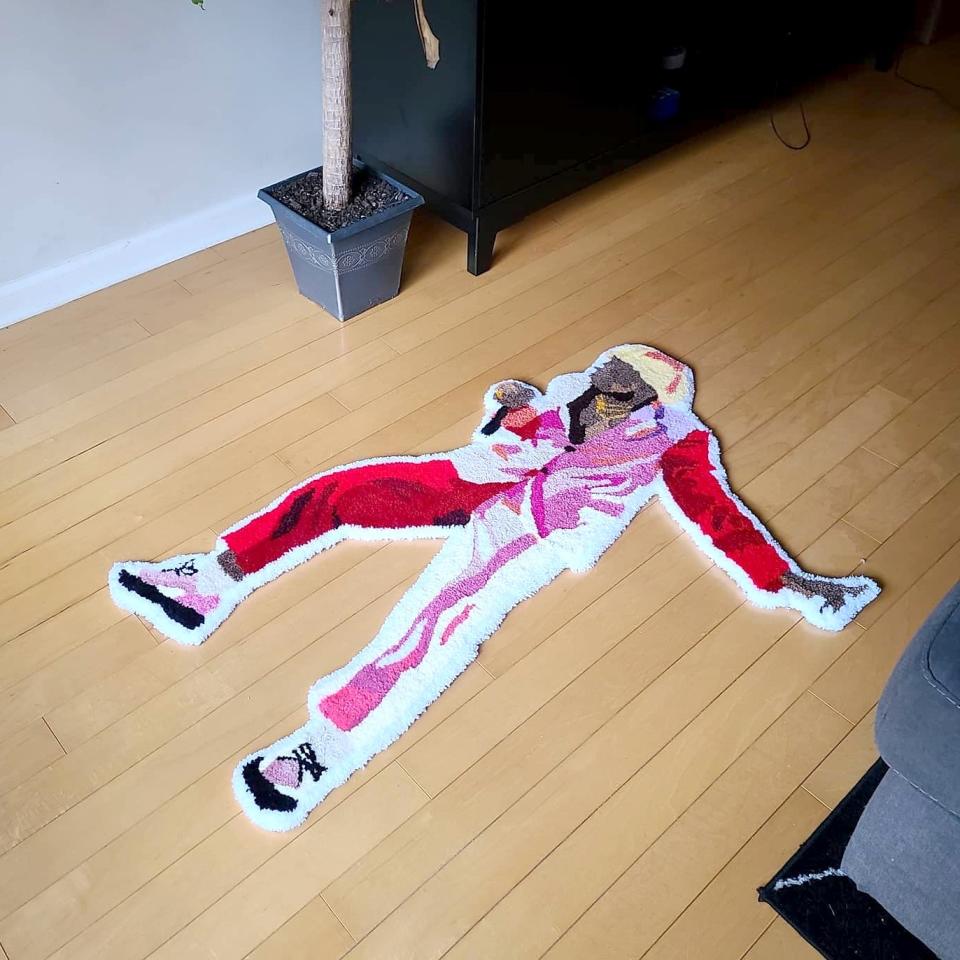
Based in Memphis, Tenn., Gentry has been in the military for eight years and works full time with the Tennessee Air National Guard as well as doing IT at a nonprofit. But the rugmaking she took up last fall has sparked something unexpected within her.
“I discovered tufting just researching on YouTube,” Gentry, 31, says. “It just was one of those things where it felt like it was my lane, and my place and something that brought me joy during the pandemic. Now it’s become something I love and want to pursue as a full-time career.”
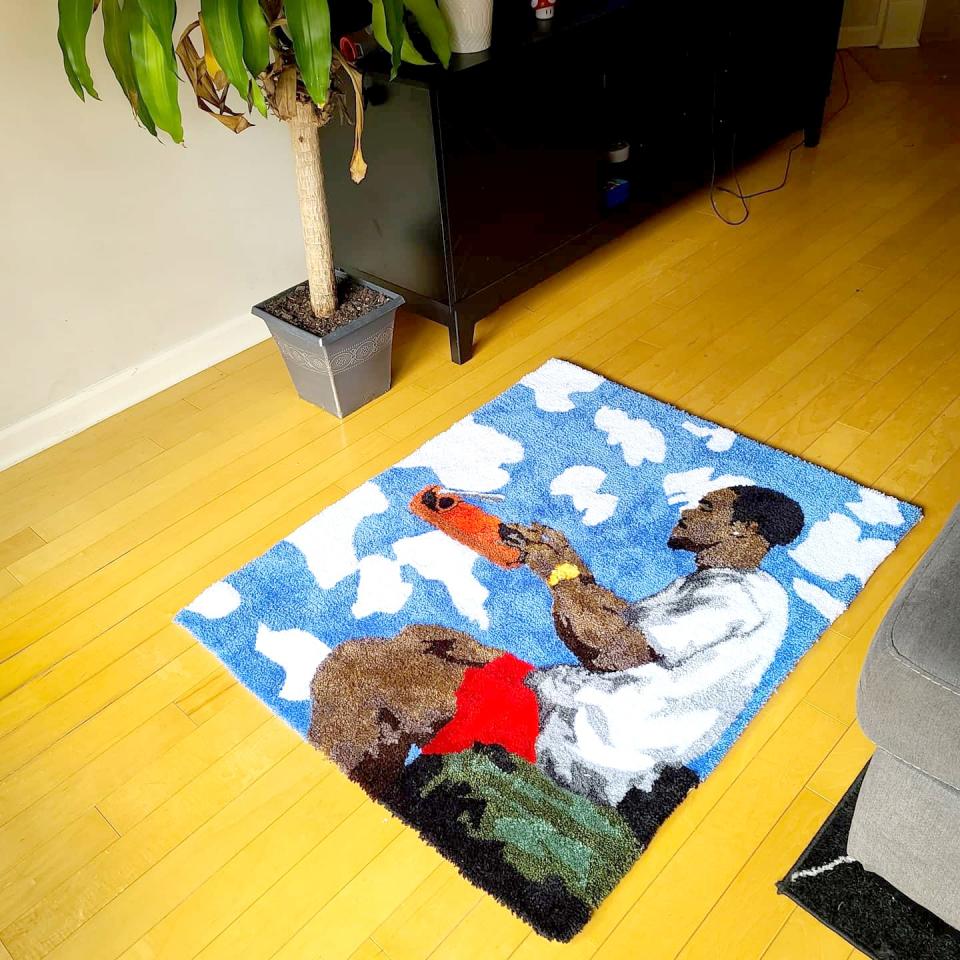
For those who were already working or studying in creative fields, the craft of tufting helped them find their niche. Before the pandemic, Amani Quinnea Jackson, a 21-year-old student at Fashion Institute of Technology in New York, had been interested in home and interior textiles. So when she discovered the world of rugs on Instagram, it felt like fate. She’s been making them since last summer.
Recently, Jackson tufted what she called an “Amanita muscaria woman” rug, which features colorful depictions of the red-and-white mushrooms shaped in the silhouette of a woman’s profile and Afro. It’s been her most popular — and expensive — rug to date, selling for $500. Selling these designs have been a way to supplement her income through the pandemic.
“These rugs have been paying for most things, along with unemployment,” she says.
It’s been a reliable side hustle for Cole and Kocinski as well — one they’re surprised they’ve kept up for as long as they have and are motivated to keep pursuing.
“You saw so many quarantine projects,” says Cole. “I’m sure 80% of them have been — no pun intended — swept under the rug.”
This story originally appeared in Los Angeles Times.

